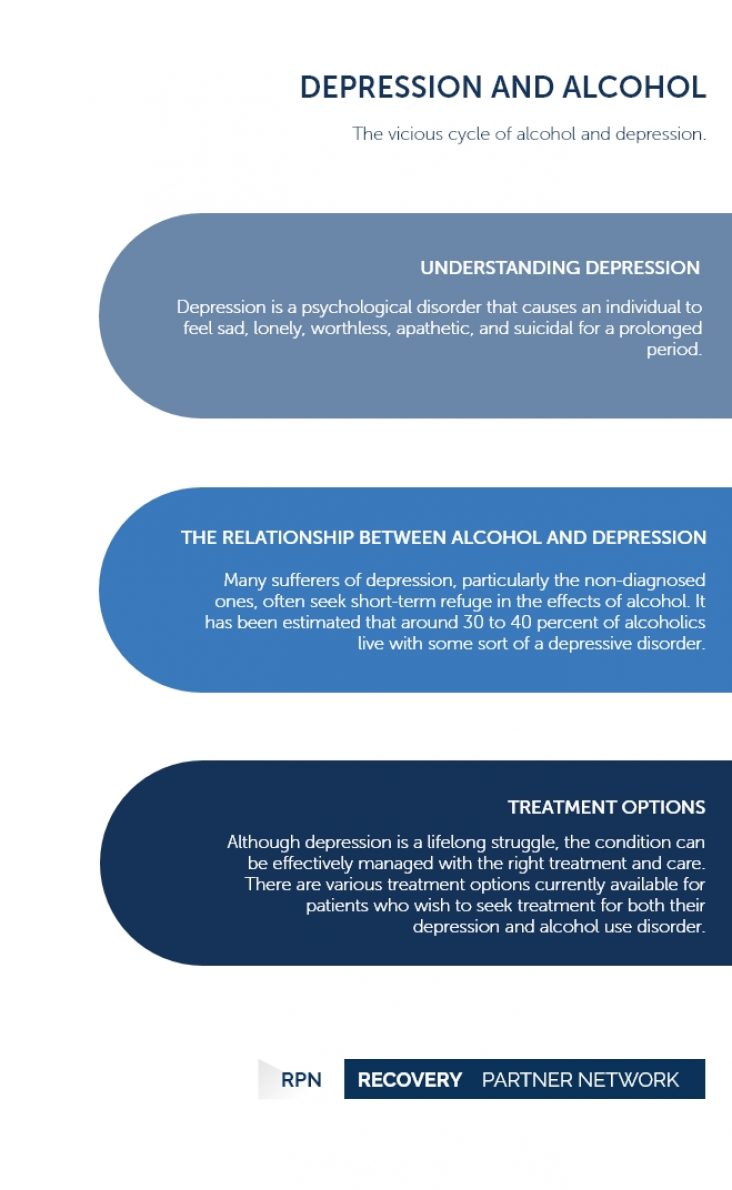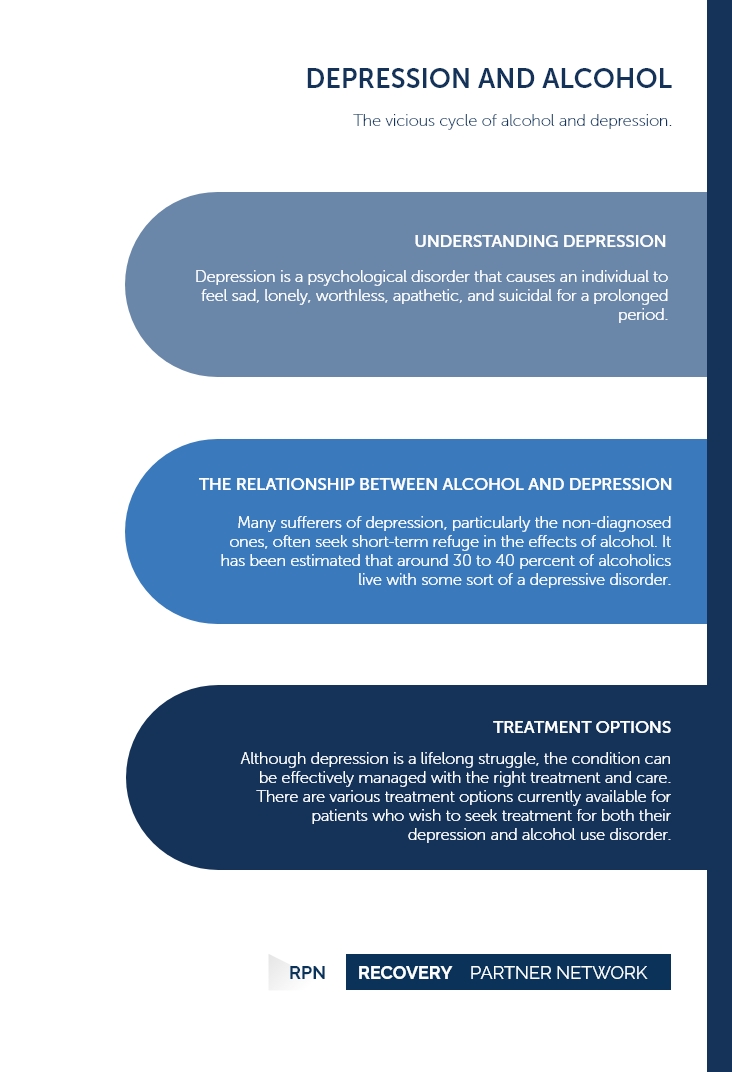The vicious cycle of alcohol and depression.
Depression and Alcohol
Alcohol depression | Table of Contents
Understanding Depression
Depression is a psychological disorder that causes an individual to feel sad, lonely, worthless, apathetic, and suicidal for a prolonged period. Although most individuals go through phases of depression during certain stages in life, this condition can sometimes be much more serious and lengthy for some individuals. Depression can negatively affect an individual’s personal and professional life and potentially lead to various health complications or even suicide. Although the exact causes of depression are yet unknown, a number of environmental, genetic, and personal factors may contribute towards its formation.
Some of the symptoms of depression are:
- Lack of energy and tiredness
- Trouble with concentration
- Sleeping too little or too much
- Difficulty making decisions
- Reduced productivity
- Weight loss or gain due to changes in appetite
- Low self-esteem
- Loss of interest in previously-enjoyed or important activities
- Increased irritability and anger
There are several types of depression, such as:
- Major depressive disorder (MDD)
- Persistent depressive disorder (PDD)
- Psychotic depression
- Postpartum depression (PPD)
- Seasonal affective disorder (SAD)
- Bipolar disorder
This is the most common form of depression that is prevalent in the US. Individuals suffering from major depressive disorders undergo acute symptoms of depression that hinder their ability to function normally. Some individuals face only a single episode of MDD, whereas most others face several episodes throughout their lives. Sufferers of MDDs are on a continuously unstable cycle of feeling very depressed at one moment and feeling symptom-free during the next.
Also known as dysthymia, this disorder is a continuous, chronic low-grade depression that usually lasts two or more years or sometimes a lifetime in some individuals.
Individuals suffering from psychotic depression experience both severe depression as well as some form of psychosis such as audio or visual hallucinations or delusions.
This is a type of depression that occurs as a result of the hormonal and physical changes associated with pregnancy, giving birth, and caring for a newborn. Around 10 to 15 percent of mothers experience postpartum depression.
Symptoms of this depression begin during the late fall and winter months when the amount of sunlight decreases significantly. In most instances, light therapy can be an effective means of treatment for this condition.
Also known as bipolar depression and manic depression, this condition is a mental disorder that was previously regarded as a type of depression. Individuals with bipolar disorders drastically alternate between episodes of depression and mania (a state of extreme energy and exaggerated mood). Nevertheless, bipolar disorders are very often misdiagnosed as depression, as most sufferers fail to report the less frequent manic episodes.
FAQ
- Is alcohol bad for anxiety and depression?
- What happens if you drink while on antidepressants?
- How long does alcohol induced depression last?
- What is an alcohol-induced mood disorder?
Although alcohol helps suppress feelings of anxiousness and depression temporarily, once the effects wear off, the rebound effects of anxiety and depression can be far worse than before.
Drinking alcohol while on antidepressants can increase the side effects of certain antidepressants or make the medication ineffective.
The symptoms of alcohol-induced depression can be reversed after 3 to 4 weeks of alcohol abstinence.
Alcohol-induced depressive disorder refers to a depressive-like syndrome that occurs shortly after alcohol withdrawal or intoxication.
The Relationship Between Alcohol and Depression
Alcohol abuse and depression share a close relationship with one another. Many sufferers of depression, particularly the non-diagnosed ones, often seek short-term refuge in the effects of alcohol. This makes alcohol abuse quite widespread among sufferers of depression. It has been estimated that around 30 to 40 percent of alcoholics live with some sort of a depressive disorder.
Although alcohol performs a significant role in temporarily providing relief for symptoms of depression, prolonged abuse can actually worsen the condition due to the physical and psychological consequences of problem drinking. Numerous studies have consistently proven that alcohol abuse increases the frequency and severity of depressive episodes and suicidal thoughts. Thus, individuals who self medicate with alcohol fall into a vicious cycle of abusing alcohol to ease depression, while the depression worsens with repeated alcohol abuse.
In certain instances, alcoholism can also be the cause of depression. Prolonged alcohol abuse can dramatically rewire the brain and cause chemical imbalances, particularly to the neurotransmitters in the brain that are responsible for sending chemical and electric impulses, as well as regulating the functioning of the brain and body. These systematic changes that occur due to alcohol abuse can cause depression.
FAQ
- How does alcohol affect your mental health?
- How many alcoholics suffer from mental health issues?
- Why should those who suffer from depression not drink alcohol?
- Can giving up alcohol make you feel depressed?
Alcohol impacts the same areas of the brain that help regulate mood. The chemical alterations in the brain caused by alcohol over time can lead to mental health conditions such as anxiety and depression.
Around one-third of those who struggle with alcohol use disorder also suffer from a mental illness.
Drinking can heighten the symptoms of depression, which could lead to life-threatening implications.
Alcohol increases the levels of dopamine in the brain while also decreasing the brain’s natural dopamine process. When you stop drinking alcohol, the brain is no longer able to depend on the dopamine produced by alcohol. This causes individuals to feel depressed till the natural levels of dopamine are sustained.
Treatment Options
Depression is a serious condition that often results in destructive consequences to an individual’s physical and psychological aspects of life. The seriousness of this condition is further aggravated by the fact that only a small percentage of sufferers actually seek help. This is mainly due to the stigma associated with this condition and the lack of the motivation to seek help.
Fortunately, there are various treatment options currently available for patients who wish to seek treatment. Although depression is a lifelong struggle, the condition can be effectively managed with the right treatment and care. Receiving treatment for this condition can significantly improve the length and quality of a patient’s life.
Since depression is quite prevalent among alcoholics, almost all treatment centers are well-equipped to help patients overcome both depression and alcohol use disorder simultaneously. However, it is vital for a patient to seek treatment as soon as possible.
Depression is treated with a combination of therapies such as:
- Cognitive-behavioral therapy (CBT)
- Antidepressants
- Holistic therapy
- Support groups
- Dialectical behavior therapy (DBT)
- Counseling and other types of therapy
Recovery Partner Network
We aim to educate and empower. If you feel our library of resources does not cover your specific need, reach out to us, and we would be happy to help.
STATISTICS
© Copyright 2025


